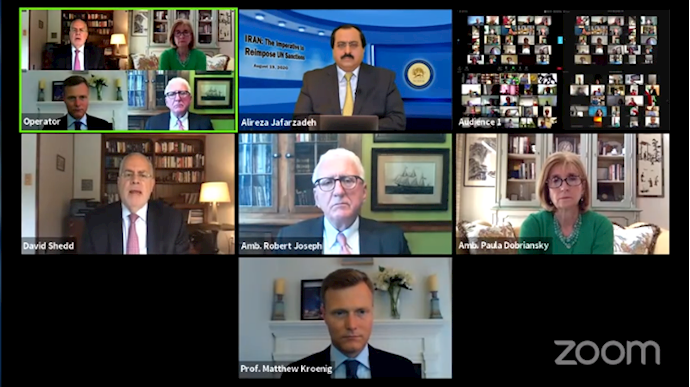Reporting by PMOI/MEK
Iran, August 19, 2020—It is imperative for global peace and security to reimpose all United Nations sanctions on the mullahs’ regime ruling Iran, according to panelists participating in a webinar debate on Wednesday, August 19, hosted by the Iranian opposition National Council of Resistance of Iran (NCRI) in Washington.
Alireza Jafarzadeh, Deputy Director of the NCRI US Representative Office
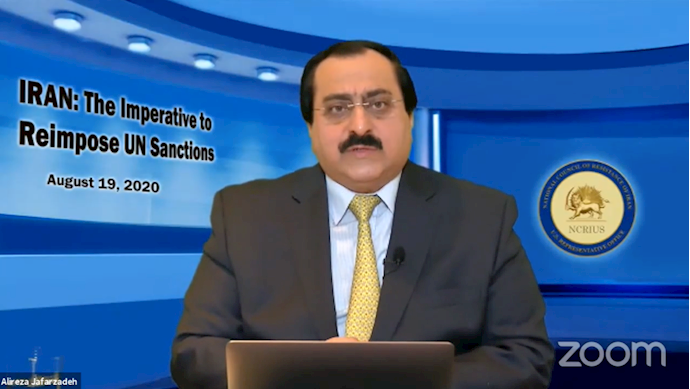
Alireza Jafarzadeh, Deputy Director of the NCRI US Representative Office, speaking at the Iranian opposition NCRI webinar discussing the imperative to reimpose UN sanctions on the mullahs’ regime ruling Iran—August 19, 2020
More than 90,000 people have died of Covid-19 across the country. Instead of allocating money to save lives, the regime has provided $400 million to Hezbollah in Lebanon in the past six months as opposed to $300 million to counter the Covid-19 pandemic for a population of 85 million in Iran. That’s 59 cents per person per month.
While the highest paid nurses in Iran get at most $200 per month, the Iranian regime pays its proxies at least five times that amount. This shows where the priorities of this regime are.
David Shedd, former acting Director of the Defense Intelligence Agency
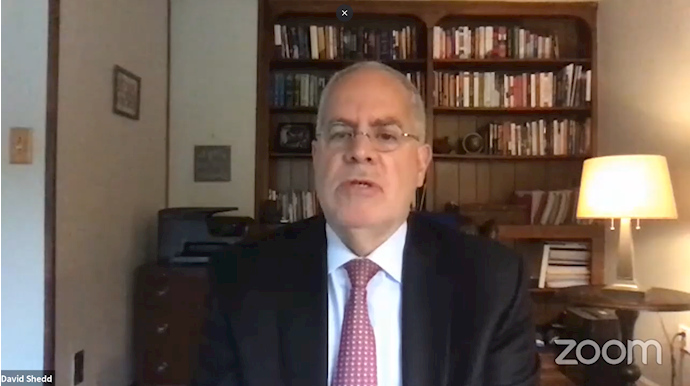
David Shedd, former acting Director of the Defense Intelligence Agency, speaking at the Iranian opposition NCRI webinar discussing the imperative to reimpose UN sanctions on the mullahs’ regime ruling Iran—August 19, 2020
The idea of the arms embargo from 2007, one of the few silver lining of the JCPOA was not negotiating on the arms embargo. Around the region, I’ve come away with three principles:
- Good behavior by the international community has not been matched by good behavior by the Iranian regime. They are challenging the international order.
- The Iranian regime rules with a despotic hand when it comes to the interests of the Iranian people. Protests are suppressed by the regime’s security apparatus.
- It has made an alliance with Russia, China, and North Korea, and other bad actors when it comes to their missiles program and other malign behavior.
They are not a good citizen of the civilized world.
Amb. Paula Dobriansky, former United States Special Envoy for Northern Ireland
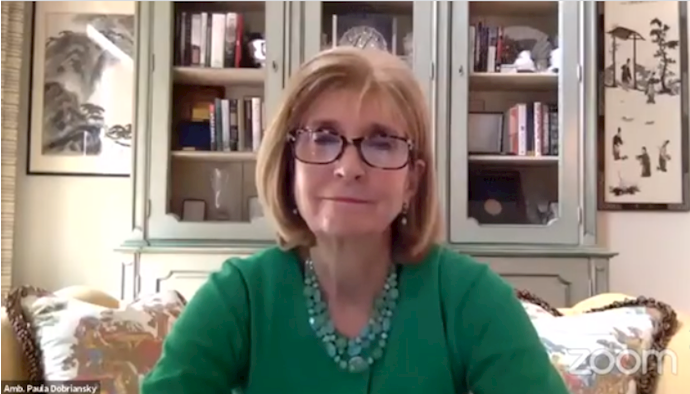
Amb. Paula Dobriansky, former United States Special Envoy for Northern Ireland, speaking at the Iranian opposition NCRI webinar discussing the imperative to reimpose UN sanctions on the mullahs’ regime ruling Iran—August 19, 2020
You cannot look at Iran out of the geopolitical context. Iran is engaged in malign activities that undermine not only our interests but also those of our allies.
Russia and China have established strategic partnerships with Iran. More than 70 percent of Iran’s arms imports come from Russia, its third largest buyer. Energy is also a crucial sector and Iran has formed an alliance with Russia and Qatar to export gas. Both Russia and Iran prop up the Assad regime in Syria.
In July the Iranian foreign minister made two visits to Moscow.
The Iranian regime held the first naval exercise with China and Russia recently. There’s the 25-year partnership between Iran and China. This agreement involves extensive military cooperation and intelligence sharing. Apparently, China has also pledged to invest $400 billion in iran. In return, Iran provides regular oil deliveries at a discount.
These powers are helping each other in their expansionist aims.
My second point: The U.S.-Europe divide over Iran. EU members and the UK opted to abstain on the arms embargo vote. Estonia and Germany also abstained. This is because of the support for the 2015 Iran nuclear deal, formally known as the Joint Comprehensive Plan of Action (JCPOA) and it has to be taken into context over the policies we pursue. It’s unfortunate they took that path given the facts on the ground.
UAE, Bahrain, and Saudi Arabia are aligned with Israel to counter Iran’s hegemonic activities. They view Iran as a direct threat, and rightly so. The UN stated that Iran was responsible for the attack on Saudi oil facilities last September.
Removing the arms embargo would allow Iran to continue its hegemonic goals in the region.
The conditions in Iran today is also worth noting, specifically the human rights record. All reports speak to the brutal actions and the egregious human rights record. Last November massive protests took place across all of Iran’s provinces. Lethal force was used to suppress and kill hundreds of innocent protesters, injuring thousands. The State Department reported 1,500 killed and 9,000 detained, but the real numbers can be much higher.
Sixty percent of executions are kept secret. I’m only scratching the surface, but it underscores the need for moving forward with the maximum pressure campaign and the snapback of sanctions.
Prof. Matthew Kroenig, from the Department of Government and the Edmund A. Walsh School of Foreign Service at Georgetown University
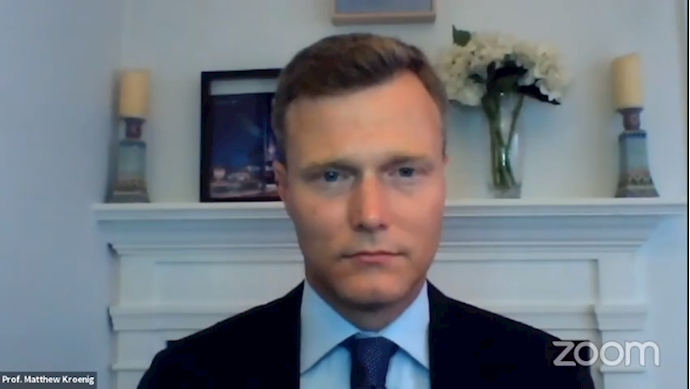
Prof. Matthew Kroenig of Georgetown University speaking at the Iranian opposition NCRI webinar discussing the imperative to reimpose UN sanctions on the mullahs’ regime ruling Iran—August 19, 2020
On the threat of the regime, we see autocratic regimes posing a major threat to the U.S. Iran represents that threat in the Middle East. In the region, Iran’s nuclear program breakout time has shrunk to six months or less, and is engaged in destabilizing activities in the region. This is a serious challenge.
The Trump administration has a clear maximum pressure strategy.
The pressure has made it more difficult for Iran to fund its nuclear program and destabilizing activities. We are seeing unprecedented levels of pressure on the regime. We are seeing the protests and uprisings in the country. The regime is in a difficult spot. I think they are waiting out the U.S. elections. But no matter the outcome, I think they will come to the negotiation table.
On the embargo, lifting the arms embargo would pose a problem for the U.S. and its allies. Our European allies don’t want to see this happen. The best remaining option is to snapback the arms embargo. The U.S. is within its rights to snapback the sanctions.
There’s bipartisan consensus to prevent Iran from building a nuclear weapon. I hope we can keep the pressure on Iran and negotiate a better deal.
Amb. Robert Joseph, former Under Secretary of State for Arms Control and International Security
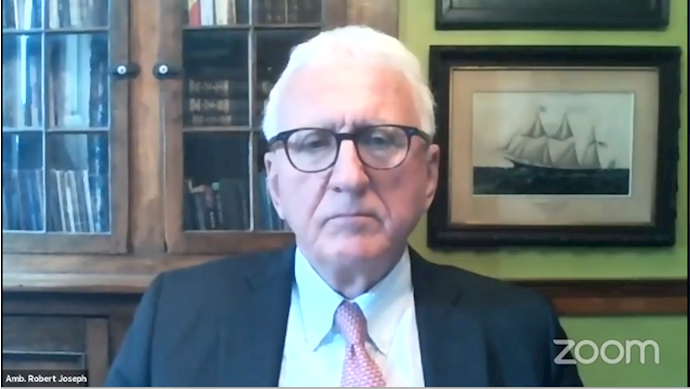
Amb. Robert Joseph, former Under Secretary of State for Arms Control and International Security, speaking at the Iranian opposition NCRI webinar discussing the imperative to reimpose UN sanctions on the mullahs’ regime ruling Iran—August 19, 2020
The question of extending the UN arms embargo provides a microcosm of wider issues. It is self-evident that continuing the arms embargo is necessary for the U.S. and the international community. Without the embargo, Iran would gain access to advanced capabilities to further its regional aggressions.
Failing to extend the embargo would be the end of any prospect for establishing multilateral sanctions in the future. Failure to lead and prevail on this issue would have negative consequences for the U.S. It could also have wider implications for the UN Security Council.
Let’s not forget how many times the previous administration said there was a binary choice between war and negotiations. Negotiation is not always the best solution. Just ask Mr. Chamberlain who had a successful negotiation with Hilter. The negotiation encouraged the Germans to continue their aggressions.
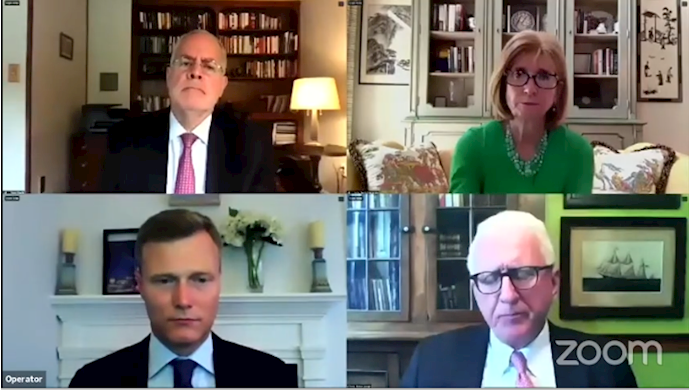
Iranian opposition NCRI webinar gathers experts weighing the imperative to reimpose United Nations sanctions on the mullahs’ regime ruling Iran—August 19, 2020
Every administration for the past 30 years have sought meaningful talks with Iran but without success. If you think JCPOA was a success you need to task what it achieved. It did not lead to a more moderate Iran. The regime used billions of dollars to expand its aggression abroad and suppress its people.
But the problem is not the JCPOA. It’s the regime. It will never abandon terror. It will not give up its ambitions for nuclear weapons. While we dream of a different Iran, that dream will become a nightmare if we do not acknowledge the regime as the real problem.
Negotiations in good faith with this regime are simply not an option. The other option is to keep the maximum pressure on the regime. Sanctions have had a profound effect. Iran’s economy is in shambles because of the regime’s incompetence, corruption, and international sanctions. The regime has nowhere to turn now. Selling up the country’s future to China is the next desperate act. We must not throw the regime another lifeline. We must deny the regime its legitimacy by highlighting its reign of terror for the past 40 years. The regime must be held accountable for their crimes against humanity.
The regime is the greatest threat to its own people. The killing of people is a desperate act by the regime. Statements by our President and Secretary of State are important. Regime change must come from within and will come from within.
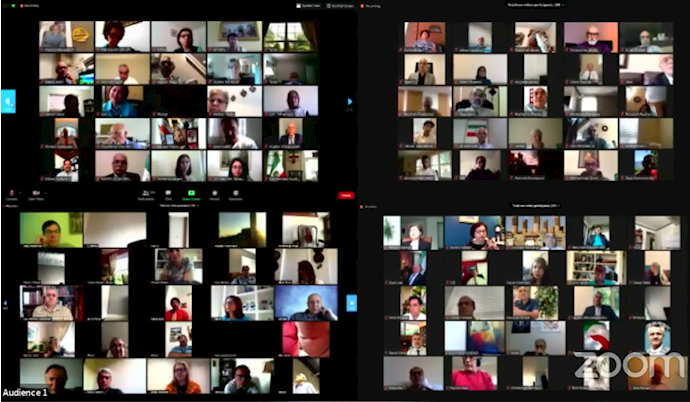
People from across the globe joined in on the Iranian opposition NCRI webinar discussing the imperative to reimpose United Nations sanctions on the mullahs’ regime ruling Iran—August 19, 2020


